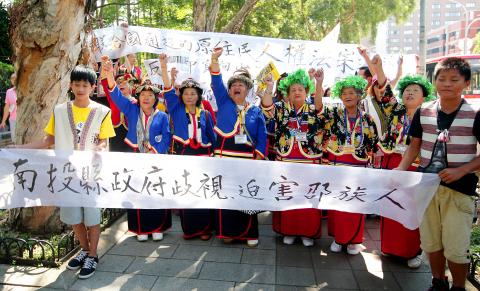Performing a traditional exorcism ritual, a group of Thao Aborigines yesterday protested against a build-operate-transfer (BOT) resort project near Sun Moon Lake on Thao traditional lands, for which the government gave initial approval without consulting them.
Sprinkling self-brewed alcohol into the sky with her fingers while reciting spells, an elderly Thao shaman performed the traditional ritual to drive away evil spirits in front of the Executive Yuan.
“The evil is in there,” she said, pointing at the Executive Yuan compound.

Photo: CNA
Following the shaman were dozens of Thao Aborigines in their traditional dress, holding banners accusing the government of exploiting the Thao and urging the government to return their traditional domains to them.
“Sun Moon Lake and the surrounding areas are traditional territories of the Thao, but now the government is introducing Chinese capital to build a resort without having consulted us as the Aboriginal Basic Act [原住民族基本法] requires,” Thao National Assembly Speaker Banu Bagamumu told reporters.
While the government promised that the resort would bring jobs to locals, Banu Bagamumu said that Chinese tour agencies always bring along their own business partners and “the project will not benefit us at all.”
He called on the Executive Yuan to nullify its initial approval for the project and suspend all BOT plans before a program to revive traditional Thao culture is in place.
Indigenous Peoples’ Action Coalition secretary-general Omi Wilang, an Atayal, said that currently, there are only a few thousand Thao left in the country, who are struggling to keep their tribe and their culture alive.
“What the government should do for an ethnic group that is in such a disadvantaged position is protect, not to accelerate its peril,” Omi Wilang said.
Democratic Progressive Party Legislator Tien Chiu-chin (田秋堇) said that besides assessing the impact of the development project on the environment, the government “should equally assess its impact on the Thao culture.”
The Sun Moon Lake National Scenic Area Administration Office and the Nantou County Government are planning to work with a developer to build a four-star resort hotel costing more than NT$2 billion (US$66 million) near the lake.
The project is financed by Hong Kong’s Bonds Group. If it goes ahead as planned, the resort will be completed and opened in 2017.
Thao Aborigines and their supporters are expected to protest in front of the Environmental Protection Administration in Taipei on Friday.

US President Donald Trump yesterday announced sweeping "reciprocal tariffs" on US trading partners, including a 32 percent tax on goods from Taiwan that is set to take effect on Wednesday. At a Rose Garden event, Trump declared a 10 percent baseline tax on imports from all countries, with the White House saying it would take effect on Saturday. Countries with larger trade surpluses with the US would face higher duties beginning on Wednesday, including Taiwan (32 percent), China (34 percent), Japan (24 percent), South Korea (25 percent), Vietnam (46 percent) and Thailand (36 percent). Canada and Mexico, the two largest US trading

AIR SUPPORT: The Ministry of National Defense thanked the US for the delivery, adding that it was an indicator of the White House’s commitment to the Taiwan Relations Act Deputy Minister of National Defense Po Horng-huei (柏鴻輝) and Representative to the US Alexander Yui on Friday attended a delivery ceremony for the first of Taiwan’s long-awaited 66 F-16C/D Block 70 jets at a Lockheed Martin Corp factory in Greenville, South Carolina. “We are so proud to be the global home of the F-16 and to support Taiwan’s air defense capabilities,” US Representative William Timmons wrote on X, alongside a photograph of Taiwanese and US officials at the event. The F-16C/D Block 70 jets Taiwan ordered have the same capabilities as aircraft that had been upgraded to F-16Vs. The batch of Lockheed Martin

GRIDLOCK: The National Fire Agency’s Special Search and Rescue team is on standby to travel to the countries to help out with the rescue effort A powerful earthquake rocked Myanmar and neighboring Thailand yesterday, killing at least three people in Bangkok and burying dozens when a high-rise building under construction collapsed. Footage shared on social media from Myanmar’s second-largest city showed widespread destruction, raising fears that many were trapped under the rubble or killed. The magnitude 7.7 earthquake, with an epicenter near Mandalay in Myanmar, struck at midday and was followed by a strong magnitude 6.4 aftershock. The extent of death, injury and destruction — especially in Myanmar, which is embroiled in a civil war and where information is tightly controlled at the best of times —

China's military today said it began joint army, navy and rocket force exercises around Taiwan to "serve as a stern warning and powerful deterrent against Taiwanese independence," calling President William Lai (賴清德) a "parasite." The exercises come after Lai called Beijing a "foreign hostile force" last month. More than 10 Chinese military ships approached close to Taiwan's 24 nautical mile (44.4km) contiguous zone this morning and Taiwan sent its own warships to respond, two senior Taiwanese officials said. Taiwan has not yet detected any live fire by the Chinese military so far, one of the officials said. The drills took place after US Secretary